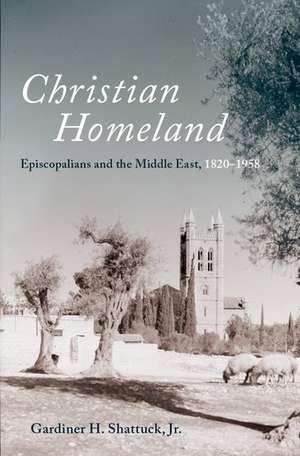Christian Homeland: Episcopalians and the Middle East, 1820-1958
Autor Gardiner H. Shattuck, Jr.en Limba Engleză Hardback – 24 ian 2023
Preț: 581.63 lei
Preț vechi: 706.40 lei
-18% Nou
Puncte Express: 872
Preț estimativ în valută:
111.33€ • 120.97$ • 93.58£
111.33€ • 120.97$ • 93.58£
Carte disponibilă
Livrare economică 20-26 martie
Preluare comenzi: 021 569.72.76
Specificații
ISBN-13: 9780197665039
ISBN-10: 0197665039
Pagini: 304
Dimensiuni: 163 x 237 x 27 mm
Greutate: 0.56 kg
Editura: Oxford University Press
Colecția OUP USA
Locul publicării:New York, United States
ISBN-10: 0197665039
Pagini: 304
Dimensiuni: 163 x 237 x 27 mm
Greutate: 0.56 kg
Editura: Oxford University Press
Colecția OUP USA
Locul publicării:New York, United States
Recenzii
In Christian Homeland, Gardiner Shattuck directs our attention to the Episcopal Church's engagement with the Middle East in the 19th and 20th centuries... While there have been recent moments in this activism when rhetoric has been antisemitic in nature, Shattuck reminds us that this is not an anomaly.
Christian Homeland is an excellent book that covers some troubling material. It will interest historians of the United States and its foreign relations, Middle Eastern and Middle Eastern American Christian communities, and American anti-Semitism. Subtle, honest, and raw, Shattuck's study should prompt Episcopalians to engage in some serious soul-searching about their church history.
Heather J. Sharkey, In Christian Homeland, Shattuck fills a gaping hole in historical studies of American missions in the Middle East, which until now have focused primarily on Egypt, Syria/Lebanon, and Iran and have given little attention to Episcopalian activities. Anchored in American religious history, this meticulous research draws on untapped American and British archival materials. The book unearths new information about Episcopalian missionary encounters with the Christians of Anatolia, Persia, and Mesopotamia, about Episcopalian support for refugees from these communities in the early twentieth-century US, and about later Episcopalian engagements with Palestine.
Gardiner Shattuck, a well-respected historian of the Episcopal Church, here unravels the neglected story of the role of Episcopalians in the Middle East -- first as missionaries, later as political advocates who sought to influence American policy in that region's always-convoluted affairs. He is particularly effective in highlighting the anti-Jewish stance of many church members as Israel attained nationhood following World War II.
An intriguing story emerges from Christian Homeland, of a deep solidarity which emerged between American missionaries from a denomination which once propagated theological doctrines supporting the 'restoration' of Jews to Palestine, and Arab Palestinians facing an existential threat from Zionism.
Christian Homeland fills a gaping hole in historical studies of American missions in the Middle East, which until now have focused primarily on Egypt, Syria/Lebanon, and Iran, and have given little attention to Episcopalian activities.
Gardiner H. Shattuck, Jr.'s Christian Homeland, purports to be the first comprehensive history of the activities of the Episcopalian Church (the US branch of Anglicanism) in the Middle East.
The Introduction and Epilogue nicely bookend the work and show the relevance of history in making sense of contemporary debates. This recent addition to Shattuck's literary oeuvre is academic history at its finest.
Christian Homeland is an excellent book that covers some troubling material. It will interest historians of the United States and its foreign relations, Middle Eastern and Middle Eastern American Christian communities, and American anti-Semitism. Subtle, honest, and raw, Shattuck's study should prompt Episcopalians to engage in some serious soul-searching about their church history.
Heather J. Sharkey, In Christian Homeland, Shattuck fills a gaping hole in historical studies of American missions in the Middle East, which until now have focused primarily on Egypt, Syria/Lebanon, and Iran and have given little attention to Episcopalian activities. Anchored in American religious history, this meticulous research draws on untapped American and British archival materials. The book unearths new information about Episcopalian missionary encounters with the Christians of Anatolia, Persia, and Mesopotamia, about Episcopalian support for refugees from these communities in the early twentieth-century US, and about later Episcopalian engagements with Palestine.
Gardiner Shattuck, a well-respected historian of the Episcopal Church, here unravels the neglected story of the role of Episcopalians in the Middle East -- first as missionaries, later as political advocates who sought to influence American policy in that region's always-convoluted affairs. He is particularly effective in highlighting the anti-Jewish stance of many church members as Israel attained nationhood following World War II.
An intriguing story emerges from Christian Homeland, of a deep solidarity which emerged between American missionaries from a denomination which once propagated theological doctrines supporting the 'restoration' of Jews to Palestine, and Arab Palestinians facing an existential threat from Zionism.
Christian Homeland fills a gaping hole in historical studies of American missions in the Middle East, which until now have focused primarily on Egypt, Syria/Lebanon, and Iran, and have given little attention to Episcopalian activities.
Gardiner H. Shattuck, Jr.'s Christian Homeland, purports to be the first comprehensive history of the activities of the Episcopalian Church (the US branch of Anglicanism) in the Middle East.
The Introduction and Epilogue nicely bookend the work and show the relevance of history in making sense of contemporary debates. This recent addition to Shattuck's literary oeuvre is academic history at its finest.
Notă biografică
Gardiner H. Shattuck, Jr. is a retired Episcopal priest and historian who has written extensively about the involvement of American Protestants in political and social issues during the nineteenth and twentieth centuries. A graduate of Brown University (A.B.), General Theological Seminary (M.Div.), and Harvard University (A.M., Ph.D.), he is the author of numerous books, most recently The Episcopalians (2004). He also serves on the Board of Directors of the Historical Society of the Episcopal Church and the Steering Committee of the African American Episcopal Historical Collection at Virginia Theological Seminary.
